Financial System Adaptability and Resilience
Financial Systems differ between countries. Their configuration is sticky and does not change suddenly. A well-functioning financial system is essential for economic development by efficiently allocating capital to the highest net present value projects.
However, the resilience of financial systems is frequently challenged. For example, the Great Financial Crisis of 2007/08 was a large blow from within the system: New financial instruments fuelled a credit bubble in the United States' housing markets, which almost brought down the global financial system when it eventually burst. The crisis triggered hefty government interventions and regulatory actions to make financial systems more resilient.
More frequently, challenges like the Covid-19 pandemic, the climate crisis and the green transition of economies, and the energy crisis triggered by the war in Ukraine, again highlight the crucial importance of resilient financial systems that adapt themselves and facilitate adequate responses to shocks of the real economy alike.
The research group “Financial System Adaptability and Resilience” investigates three critical aspects of financial system adaptability and resilience. First, it uses the occurrence of major natural disasters in the United States and Germany to analyse the impact of these events on financial systems. Natural disasters are becoming more frequent and more severe because of climate change. Therefore, evidence about the role of banks in providing funding to spur economic recovery is critical.
Investigations across different configurations of financial systems, such as bank- vs. market-based economies (e. g., Germany vs. the United States), allow for highlighting which components of financial systems seem better equipped to increase financial systems resiliency.
Second, the climate crisis requires economies to transform production technologies in order to source sustainable and renewable energy inputs. By using micro-data on German plants and their headquarters' banking relationships and information about the local and federal state leading political parties in Germany, the group aims to investigate the effects of political preferences for the green transition. This group's research will thereby enhance our understanding how climate policies balance the necessary need to reduce emissions with the economic burden imposed on agents during any large-scale transition of societies.
Third, the group's research analyses the role of culture in economies. The idea is that various aspects of culture, like religion, can work as a device that holds societies together and facilitate economic transactions. Using well-established empirical laboratories coming from significant natural disasters (for example, Hurricane Katrina in 2005), the group investigates whether local economies with a higher cultural imprint coming from religion found it easier to recover faster. Other incidents for which culture can play a vital role are big corporate scandals.
Using the Volkswagen Scandal from 2015, research by this group analyses the essential role of cultural imprints for consumer reactions in responding to large corporate scandals. This is important since government and regulatory intervention tend to come late or insufficient to punish corporate wrongdoings.
Workpackage 1: Development of Financial Systems after Significant Natural Disasters
Workpackage 2: Financial Systems' Role in the Economies' Green Transition
Workpackage 3: Cultural Aspects within Financial Systems
Research Cluster
Financial Resilience and RegulationYour contact

- Department Financial Markets
EXTERNAL FUNDING
08.2022 ‐ 07.2025
OVERHANG: Debt overhang and green investments - the role of banks in climate-friendly management of emission-intensive fixed assets
The collaborative project “Debt Overhang and Green Investments” (OVERHANG) aims to investigate the role of banks in the climate-friendly management of emission-intensive fixed assets. This will identify policy-relevant insights on financial regulation, government-controlled lending and financial stability, as well as raise awareness among indebted stakeholders.
01.2015 ‐ 12.2019
Interactions between Bank-specific Risk and Macroeconomic Performance
07.2016 ‐ 12.2018
Relationship Lenders and Unorthodox Monetary Policy: Investment, Employment, and Resource Reallocation Effects
Leibniz Association
We combine a number of unique and proprietary data sources to measure the impact of relationship lenders and unconventional monetary policy during and after the European sovereign debt crisis on the real economy. Establishing systematic links between different research data centers (Forschungsdatenzentren, FDZ) and central banks with detailed micro-level information on both financial and real activity is the stand-alone proposition of our proposal. The main objective is to permit the identification of causal effects, or their absence, regarding which policies were conducive to mitigate financial shocks and stimulate real economic activities, such as employment, investment, or the closure of plants.
Refereed Publications
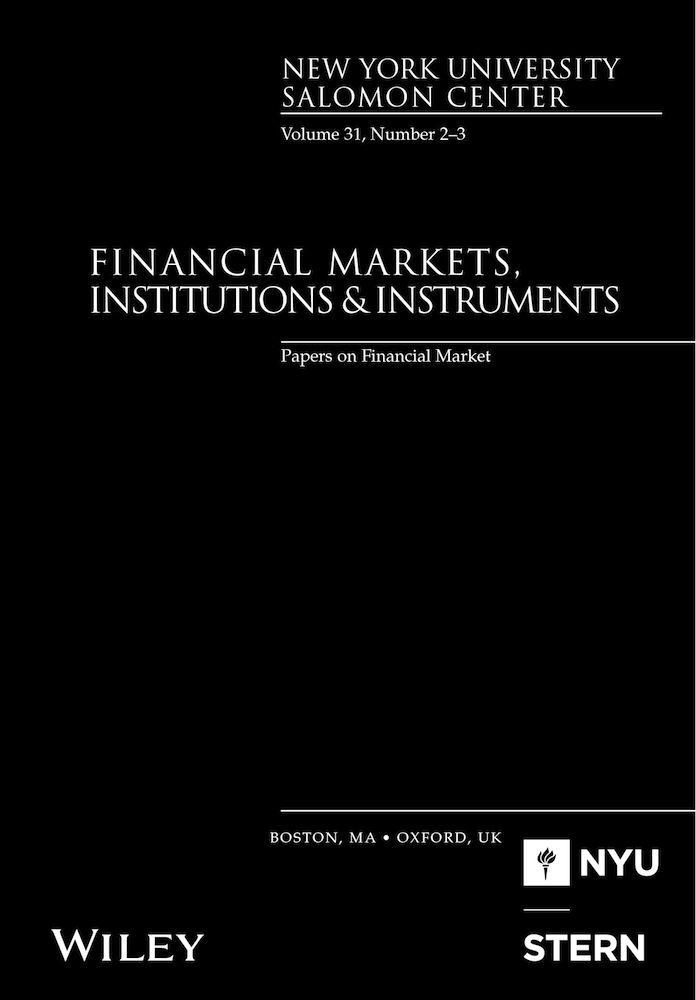
Environmental Reputational Risk, Negative Media Attention and Financial Performance
in: Financial Markets, Institutions and Instruments, No. 4, 2022
Abstract
Tracing negative media attention, this paper investigates the effect of reputational risk on firm value. Decomposing reputational damage into environmental, social and corporate-governance dimensions, it reports that environmental reputational risk has the most significant negative effect on price earnings, i.e., firms exposed to environmental risk are likely to be priced at a discount or charged a higher risk premium when discounting future earnings.

The Impact of Financial Transaction Taxes on Stock Markets: Short-Run Effects, Long-Run Effects, and Reallocation of Trading Activity
in: National Tax Journal, No. 3, 2022
Abstract
We investigate the French 2012 financial transaction tax (FTT) and find robust evidence for anticipation effects before the implementation date. Controlling for short-run effects, we only find weak evidence for a long-run reduction in trading activity. Thus, the main impact of the French FTT on trading activity is short-run. In line with liquidity clientele effects, we find a more potent effect for low-liquidity stocks and a reallocation of trading to high-liquidity stocks from the Supplemental Liquidity Provider (SLP) program. Finally, we find weak evidence for a persistent volatility reduction but no indication of a significant FTT impact on price efficiency.

Productivity, Managers’ Social Connections and the Financial Crisis
in: Journal of Banking and Finance, August 2022
Abstract
This paper investigates whether managers’ personal connections help corporate productivity to recover after a negative economic shock. Leveraging the heterogeneity in the severity of the financial crisis across different sectors, the paper reports that (i) the financial crisis had a negative effect on within-firm productivity, (ii) the effect was long-lasting and persistent, supporting a productivity-hysteresis hypothesis, and (iii) managers’ personal connections allowed corporations to recover from this productivity slowdown. Among the possible mechanisms, we show that connected managers operating in affected sectors foster productivity recovery through higher input cost efficiency and better access to the credit market, as well as more efficient use of labour and capital.
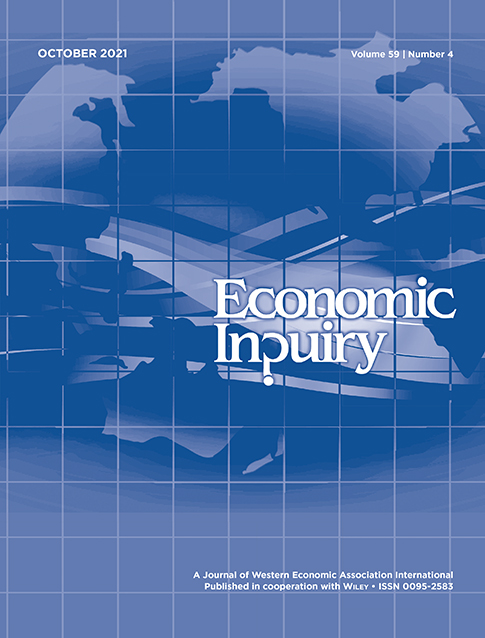
The Cleansing Effect of Banking Crises
in: Economic Inquiry, No. 3, 2022
Abstract
We assess the cleansing effects of the 2008–2009 financial crisis. U.S. regions with higher levels of supervisory forbearance on distressed banks see less restructuring in the real sector: fewer establishments, firms, and jobs are lost when more distressed banks remain in business. In these regions, the banking sector has been less healthy for several years after the crisis. Regions with less forbearance experience higher productivity growth after the crisis with more firm entries, job creation, and employment, wages, patents, and output growth. Forbearance is greater for state-chartered banks and in regions with weaker banking competition and more independent banks.

Trust, Politics and Post-IPO Performance: SOEs vs. the Private Sector
in: Economic and Political Studies, No. 3, 2022
Abstract
This paper empirically investigates the role of social trust in the long-term performance of the initial public offerings (IPOs) in China, controlling for the formal institutional environment. We find that privately owned or smaller IPO firms experience significantly better post-IPO performance when they are incorporated in regions with more social trust. The state-owned and bigger IPO firms, on the other hand, experience better long-term post-IPO performance when they are incorporated in regions with stronger formal institutions (e.g. court enforcement and contract holding). Political pluralism turns out to benefit all IPOs in the long term. In addition, our evidence shows that stronger social trust substitutes for the quality of court enforcement but complements the role of contract holding. These results are robust after controlling for alternative definitions of ownership, outliers, non-linear effects of institutions, and the potential endogeneity of institutions in the model.
Working Papers
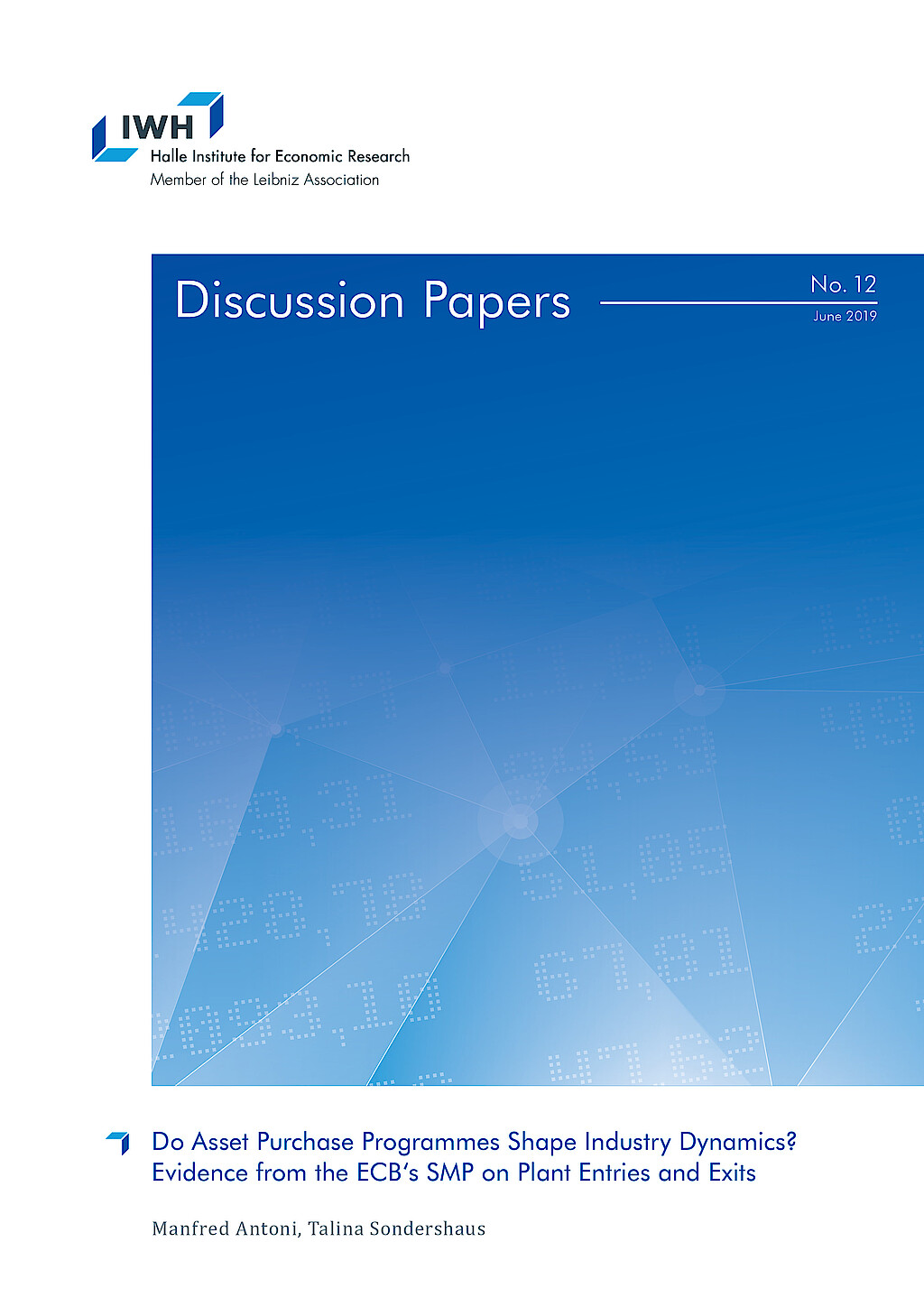
Do Asset Purchase Programmes Shape Industry Dynamics? Evidence from the ECB's SMP on Plant Entries and Exits
in: IWH Discussion Papers, No. 12, 2019
Abstract
Asset purchase programmes (APPs) may insulate banks from having to terminate relationships with unproductive customers. Using administrative plant and bank data, we test whether APPs impinge on industry dynamics in terms of plant entry and exit. Plants in Germany connected to banks with access to an APP are approximately 20% less likely to exit. In particular, unproductive plants connected to weak banks with APP access are less likely to close. Aggregate entry and exit rates in regional markets with high APP exposures are also lower. Thus, APPs seem to subdue Schumpeterian cleansing mechanisms, which may hamper factor reallocation and aggregate productivity growth.

‘And Forgive Us Our Debts’: Do Christian Moralities Influence Over-indebtedness of Individuals?
in: IWH Discussion Papers, No. 8, 2019
Abstract
This paper analyses whether Christian moralities and rules formed differently by Catholics and Protestants impact the likelihood of households to become overindebted. We find that over-indebtedness is lower in regions in which Catholics outweigh Protestants, indicating that Catholics‘ forgiveness culture and a stricter enforcement of rules by Protestants serve as explanations for our results. Our results provide evidence that religion affects the financial situations of individuals and show that even 500 years after the split between Catholics and Protestants, the differences in the mind-sets of both denominations play an important role for situations of severe financial conditions.
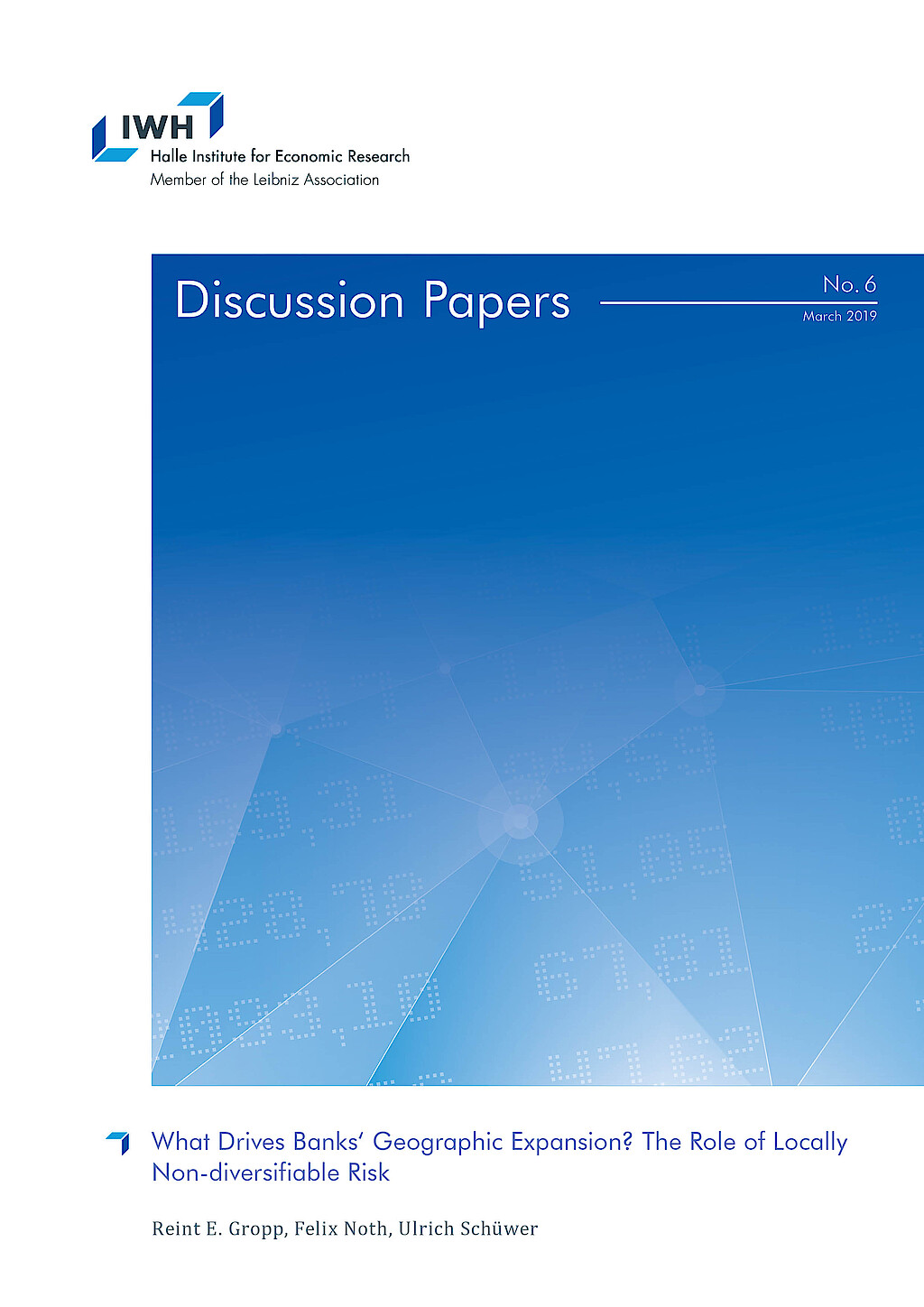
What Drives Banks‘ Geographic Expansion? The Role of Locally Non-diversifiable Risk
in: IWH Discussion Papers, No. 6, 2019
Abstract
We show that banks that are facing relatively high locally non-diversifiable risks in their home region expand more across states than banks that do not face such risks following branching deregulation in the 1990s and 2000s. These banks with high locally non-diversifiable risks also benefit relatively more from deregulation in terms of higher bank stability. Further, these banks expand more into counties where risks are relatively high and positively correlated with risks in their home region, suggesting that they do not only diversify but also build on their expertise in local risks when they expand into new regions.

Politics, Banks, and Sub-sovereign Debt: Unholy Trinity or Divine Coincidence?
in: Deutsche Bundesbank Discussion Paper, No. 53, 2018
Abstract
We exploit election-driven turnover in State and local governments in Germany to study how banks adjust their securities portfolios in response to the loss of political connections. We find that local savings banks, which are owned by their host county and supervised by local politicians, increase significantly their holdings of home-State sovereign bonds when the local government and the State government are dominated by different political parties. Banks' holdings of other securities, like federal bonds, bonds issued by other States, or stocks, are not affected by election outcomes. We argue that banks use sub-sovereign bond purchases to gain access to politically distant government authorities.
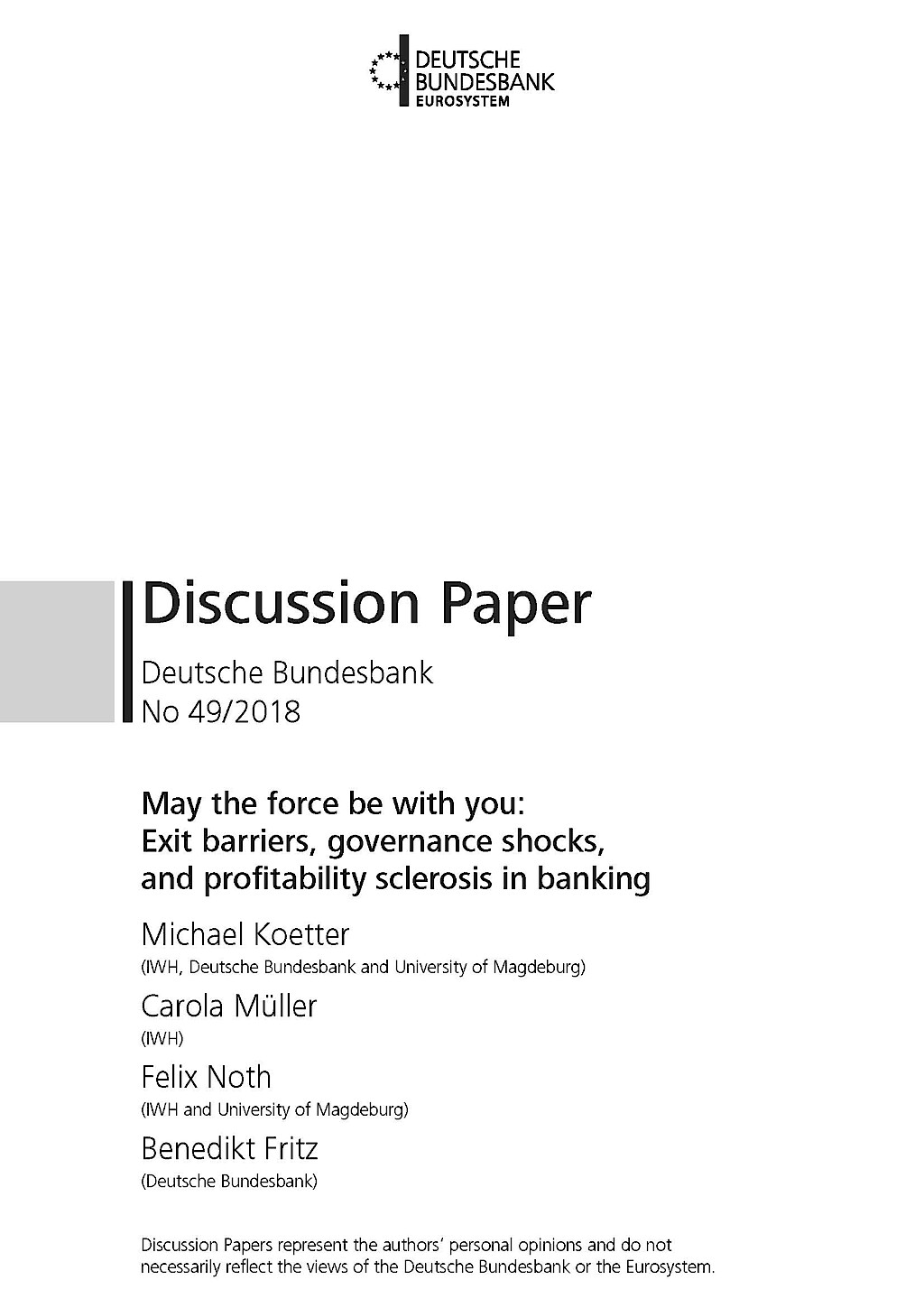
May the Force Be with You: Exit Barriers, Governance Shocks, and Profitability Sclerosis in Banking
in: Deutsche Bundesbank Discussion Paper, No. 49, 2018
Abstract
We test whether limited market discipline imposes exit barriers and poor profitability in banking. We exploit an exogenous shock to the governance of government-owned banks: the unification of counties. County mergers lead to enforced government-owned bank mergers. We compare forced to voluntary bank exits and show that the former cause better bank profitability and efficiency at the expense of riskier financial profiles. Regarding real effects, firms exposed to forced bank mergers borrow more at lower cost, increase investment, and exhibit higher employment. Thus, reduced exit frictions in banking seem to unleash the economic potential of both banks and firms.



















